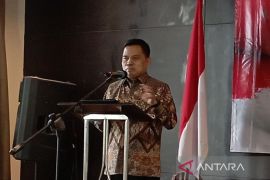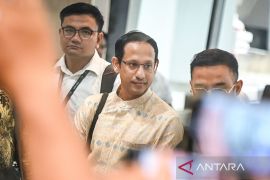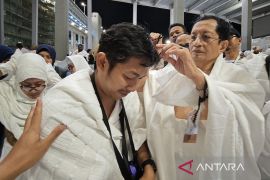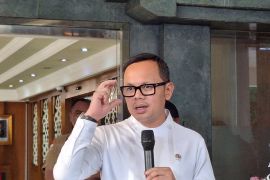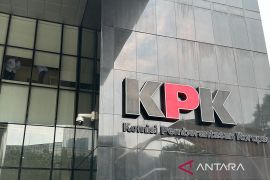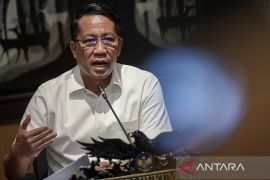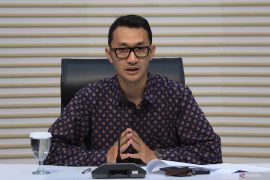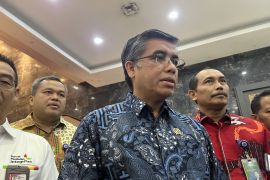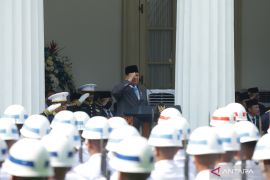NIS is aimed at solving and preventing corruption at ministries and other government institutions across the country.
Speaking at the National Conference on Corruption Eradication (KNPK) here on Wednesday, Vice President Boediono said cooperation between the government and the KPK was crucial to eradicate corruption in Indonesia.
The KNPK is an annual event organized by the KPK, which is aimed at promoting cooperation in developing the NIS.
According to Boediono, the NIS is expected to solve many issues related to corruption in the country.
"This system requires the cooperation of the public and various institutions across the country in order to be successful in fighting corruption," the vice president stated.
"The KPK has designed the NIS in a way that it can be effectively implemented at the state ministries and institutions," he noted.
"Along with the National Development Planning Board (Bappenas), the KPK and the Presidential Working Unit for Supervision and Management of Development (UKP4) will jointly implement the NIS program to foster accountability, transparency and efficiency in the working process of the ministries and institutions," KPK deputy chairman Busyro Muqqodas said at KNPK on Wednesday.
He noted that the NIS was aimed at stopping corruption in the ministries and government institutions as early as possible.
"Anti-corruption effort is a relentless struggle that has to be supported by various systems in order to avoid further corruption," Busyro said.
"Based on KPK's experience, corruption is a symptom of the weakness of individuals', families', and institutions' integrity," he continued.
"We have to focus on individual integrity, along with institutional integrity, in order for SIN to achieve the national objective of improved public welfare," Busyro stated.
He said national figures must "lead by example to help achieve a corruption-free Indonesia".
The vice president also noted that the government had formulated a National Strategy for Corruption Prevention and Eradication (Stranas PPK 2012-2025 and Stranas PPK 2012-24) and issued the Presidential Regulation No.55/2012 in its efforts to tackle corruption in the country.
"The strategy and the regulation have been developed to improve the Corruption Perception Index of the country, to ensure that the country`s policies are in line with the guidelines of the United Nations Convention Against Corruption (UNCAC), and to enhance the National Integration System Index," he added.
During the National Conference on Corruption Eradication, the KPK deputy chairman said President Yudhoyono had been asked to sign a revised government regulation on the recruitment of the KPK personnel.
Under the regulation, KPK may borrow investigators from other government institutions, including the police and the prosecution office, for a certain period.
"The problem of shortfall in KPK personnel could be handled only through a revision of government regulation No. 63/2005," Busyro explained.
"The number of KPK investigators was reduced after the Police Headquarters, in a letter dated November 30, rejected the extension of the contracts of 13 police that KPK had borrowed," he pointed out.
Earlier, the police had withdrawn 20 police officers, who were serving as KPK investigators, after their term was over.
KPK and police have been engaged in a row over the right to investigate alleged corruption by a number of high-ranking police officers.
On Tuesday, the KPK sent police Ins. Gen. Djoko Susilo, who has been accused of corruption, to a military detention cell.
The use of the military prison triggered a controversy, in response to which the KPK said it took the step because it did not have any room left in its own detention centre.
One of the 13 police officers recalled by the police was Comr Novel Baswedan, who was a key investigator for KPK and had supervised the transfer of Djoko to the military detention cell.
Novel had expressed interest for a permanent position in the KPK as an investor.
"We have received a letter from the police headquarters to discharge police officers after the end of their term 'whether it be 4 years or 8 years' while the KPK still needs them," Busyro Muqqodas said.
He noted that the plan to revise government regulation No. 63/2005 had started two years ago.
"The revision has been proposed by KPK and other related agencies after two years of talks," Busyro said.
"KPK wants the contracts to be extended for 8 to 12 years and a draft regulation for that was already sent to the President a month ago," he stated.
"If the President gives his approval, the new government regulation will be an important political move that will help KPK deal with the current problem," Busyro explained.
"Most KPK investigators are borrowed from the police, and withdrawal of these investigators causes a lot of problems for the KPK, he said.
"Solving the problem is in the hands of the state secretariat and the President," he added.
Six of the 13 investigators whose contracts with the KPK were not extended by the police have opted to become permanent KPK investigators, bringing the total number of such investigators to 28.
(O001/KR-BSR/A014)
Reporter: Otniel Tamindael
Editor: Jafar M Sidik
Copyright © ANTARA 2012
